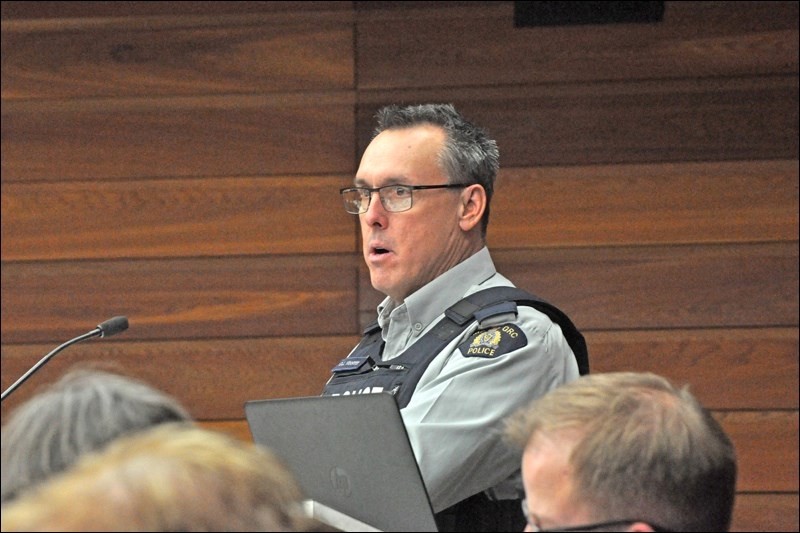There were positive numbers coming out of S/Sgt. Darcy Woolfitt’s RCMP report to North Battleford city council Monday.
Overall crime numbers for 2018 in North Battleford are on the way down, with calls for service down about four per cent. As well, there were encouraging numbers from his report about the first month of the Police and Crisis Team.
The Police and Crisis Team (PACT) was established Dec. 12 and provides first response to persons suffering from mental health and addictions issues. In that first month, 17 calls were diverted away from the emergency room, freeing up 85 man hours that would have otherwise been spent by RCMP members who would have had to wait for medical assistance alongside those affected individuals.
“It was a joint effort with Battlefords Mental Health,” said Woolfitt of the initiative. Workers have set up an office at the detachment and they are “fully engaged with our members,” he said.
The PACT team is already having noted impact, he said, with huge savings financially and in resources, as well.
Woolfitt added he had a conversation with one of the workers who said 12 calls for service were dealt with over the weekend.
“They are very happy to be engaged in this program and they’re seeing the benefit of it already,” he said.
Mayor Ryan Bater was one of the city representatives at the PACT launch Dec. 12 and had good things to say about it.
“I’m just very impressed with how that partnership came together,” said Bater. “I’m very excited about the opportunities to create efficiencies within the system.”
As for the statistics, the final numbers are in for 2018.
According to the report from Battlefords City Detachment presented at council Monday, calls for service in 2018 stood at 13,119, down from 13,665 in 2017. Calls for service for the fourth quarter stood at 3,063, which is also down from 3,303 from the period October to December 2017.
Overall numbers saw declines in most highlighted areas of interest. For persons offences, those were down from 1,269 to 1,161; criminal code offences down from 2,489 to 2,188; drug offences from 199 to 184: liquor act offences from 417 to 360: motor vehicle collisions from 275 to 266: provincial traffic offences from 1,069 to 954: impaired operation of a motor vehicle from 223 to 202; and municipal bylaw offences from 168 to 134.
Increases were noted for the year in business break and enters from 41 to 69; residential break and enters from 194 to 204; and property offences from 3,042 to 3,256.
Quarterly numbers followed a similar pattern but there were some differences. Increases were noted in both the impaired operation of a motor vehicle (from 42 to 54) and liquor act (from 58 to 81) categories. Also bucking the trend was the decline in property offences during the quarter (from 909 to 756).
Overall, the final numbers showing declines in call for service and other categories do not come as a surprise, as that has followed the trend seen in the statistics presented from the previous three quarters in 2018.
Woolfitt reiterated to council a familiar theme from his detachment, that root causes were behind much of the crime going on. He said the RCMP is finding that in all the communities they police, “much of the crime being committed has its roots in social issues: addictions, poverty, housing and food security.”
Woolfitt told council he made that comment to “reinforce the work that Mr. [Herb] Sutton is doing, the different groups that he is engaging with in the community to make a difference and make a change in the community, and so we can perhaps at some point have an effect on some of the things that are root causes, and I think we are starting to move in the right direction with the work being conducted there.”
Woolfitt also noted the RCMP were working with partner agencies to direct individuals to alternative social processes to deal with the root causes of their problems, as “opposed to involvement in the judicial system and court processes.”
Bater asked if there was any particular reason behind the reduction in the crime stats. Woolfitt said it was hard to say.
“It’s all dependent, too, on who’s in jail and who’s out of jail, and who’s decided to embark on a different path in their life.”
Woolfitt pledged the RCMP would continue their efforts with targeted crime suppression, working with the crime reduction team and their other efforts to divert people from the criminal justice system.
“Give it a few years, and we’ll probably see some more fruit from this, as we are seeing from the work Mr. Sutton is doing.”




